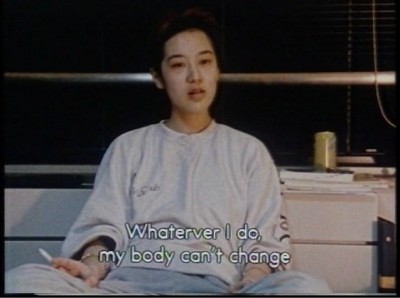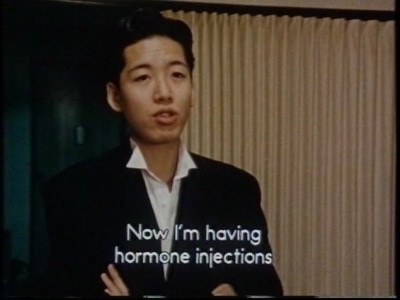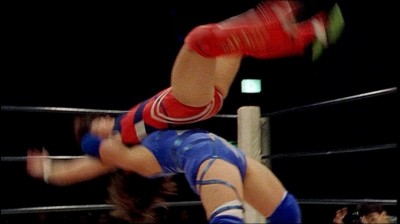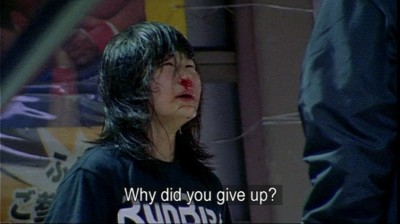| Reviews & Columns |
|
Reviews DVD TV on DVD Blu-ray 4K UHD International DVDs In Theaters Reviews by Studio Video Games Features Collector Series DVDs Easter Egg Database Interviews DVD Talk Radio Feature Articles Columns Anime Talk DVD Savant Horror DVDs The M.O.D. Squad Art House HD Talk Silent DVD
|
DVD Talk Forum |
|
|
| Resources |
|
DVD Price Search Customer Service #'s RCE Info Links |
|
Columns
|
|
|
Gaea Girls / Shinjuku Boys
The hour-long Shinjuku Boys (1995) follows three onnabe (female-to-male transsexuals) who work in a nightclub catering to a female clientele looking for escape from their daily lives of domineering husbands and bosses. Fashioning themselves as perfect boyfriends, Gaish, Tatsu, and Kazuki are paid to drink, sing karaoke, and most importantly, pay attention to the lonely-hearts that come to see them, sometimes night after night.
Through low-key cinéma vérité filmmaking, Longinotto and Williams provide insight into the professional and personal lives of the trio of onnabe. Tatsu, who shares a small apartment with a girlfriend, is the only one of the three pursuing medical sexual reassignment. Interestingly, Tatsu is also the only one of the three who feels comfortable being naked in front of his sexual partner. Kazuki is in love with a male-to-female transsexual who's undergone medical reassignment, and who performs in a drag queen revue. Gaish, the unabashed gigolo, strings along several women from the club, but secretly nurses a broken heart and wishes he'd never been born.
 |  |
Five years after making Shinjuku Boys, Longinotto and Williams paired up again for Gaea Girls, an exploration of female professional wrestling in Japan. Gaea Girls opens with a dramatic grudge match between the coach of the Gaea franchise, Nagayo Chiyusa and her former tag-team partner Lioness Asuka. The expertly-choreographed fight between Nagayo and her rival unfolds without comment or apparent cynicism from the filmmakers, giving the viewers a look at what the would-be professionals aspire to, before delving into the training of a would-be wrestler which forms the film's principal focus.
The women of Gaea train in a nondescript two-story warehouse surrounded by small farms and modern homes. The building is a self-contained boot-camp for the trainees with bunk beds upstairs, and an open kitchen and wrestling gym downstairs. Among the trainees, Longinotto and Williams focus on the efforts of Takeuchi Saichi. Takeuchi, who'd already been training a year before filming began, is determined but lacking in the ferocity that coach Nagayo demands. Her testing is so brutally unforgiving that three other trainees quit after seeing it, and Longinotto and Williams too are silently reduced to tears through they continue to document the spectacle.
Bloody, exhausted, and crying uncontrollably following a nonstop series of brutal bouts with Gaea's professionals, Takeuchi is repeatedly slapped, verbally degraded, and ordered to leave, before she is finally accepted within the circle of professionals. In the aftermath of the testing, coach Nagayo explains to the camera that her training philosophy is based on her own experiences of brutality at the hands of her father, and that she hoped to make her trainees so angry and hard as to excel in the face of adversity.
Gaea Girls culminates with Takeuchi's first professional bout concluding her transformation from trainee to professional. The documentary is a success on its narrow terms, but leaves out any consideration of the mechanics of how the fights are arranged, fixed, and choreographed.
 |  |
Presentation
Gaea Girls / Shinjuku Boys was released by the UK-based boutique DVD label Second Run on a single dual-layered DVD which is PAL-encoded but not region restricted.
Video & Audio:
Shinjuku Boys which was shot on 16mm, and is presented in its original 1.33:1 aspect ratio looks to have been sourced from video. The image is dark, colors are muted, focus is soft, and subtitles are burned-in. Gaea Girls, shot on 35mm and presented in anamorphic widescreen (1.78:1) looks considerably better with bright colors, excellent blacks, fine grain, and good detail, though it too suffers from non-removable subtitles.
Audio for both documentaries is presented in stereo. Dialogue is both are easily understandable, though there is some tape hiss at times in Shinjuku Boys.
Extras:
The only extra is a 16-page booklet with production notes, recollections from co-director Jano Williams, and an essay by Sophie Mayer heavy on post-modern feminist analysis.
Final Thoughts:
Another fine release from Second Run, Gaea Girls / Shinjuku Boys is recommended for fans of observational documentaries.
|
| Popular Reviews |
| Sponsored Links |
|
|
| Sponsored Links |
|
|
| Release List | Reviews | Shop | Newsletter | Forum | DVD Giveaways | Blu-Ray | Advertise |
|
Copyright 2024 DVDTalk.com All Rights Reserved. Legal Info, Privacy Policy, Terms of Use,
Manage Preferences,
Your Privacy Choices | |||||||














